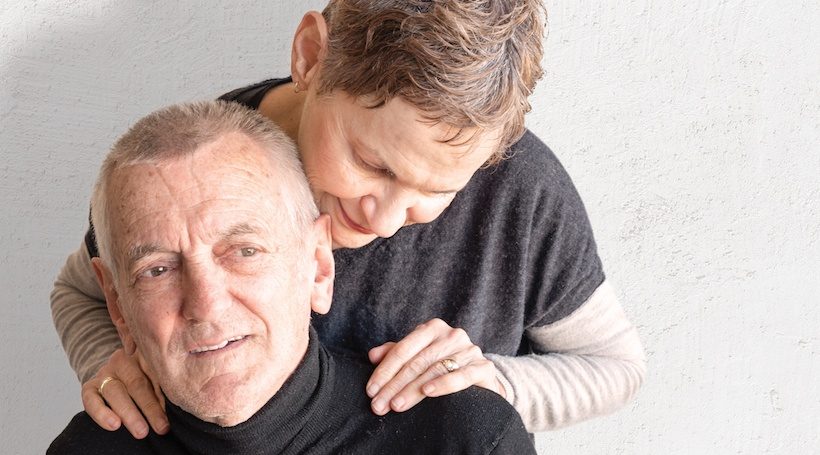Emily Hughes* is at the end of her rope. Ever since her husband was diagnosed with Parkinson’s disease six years ago, she has been his one and only caregiver – and now she’s exhausted.
“He can’t move more than an inch until his medications start kicking in,” she says. “He can’t get out of bed by himself, and I have a bad back. He is incontinent at night. I help him shower and shave. Everything is left up to me.”
Hughes’ daughter helps out whenever possible, but she has three young children and a full-time job to keep her busy. “I need help, I know,” Hughes admits. “I have to give in and get help in the house, because I can’t do it anymore. I don’t know what I’m going to do.”
She’s not the only one. According to the Centers for Disease Control and Prevention (CDC), 83 percent of caregiving for adults isn’t done by professionals, but by informal caregivers – family members like Hughes. And when you’re the only one taking care of someone, it’s easy to lose it.
“It’s caregiver burnout – when you’re just going through the motions of care and doing it out of a sense of grim obligation,” says Michael Clark, director of Rutgers-Camden’s Doctor of Nursing Practice program. “You’re still doing it, but like a zombie.”
Clark says someone giving all their time to care for another can allow stress, anxiety and loneliness to build up until they are burned out, detached and angry. “It’s a problem. There is evidence that severe stress associated with caregiving shortens the life of caregiver; some studies say by up to five years.”
“The No. 1 negative effect of burnout by far is that the caregiver sleep cycle is so significantly interrupted it starts a downward spiral,” he continues. A weak immune system, extreme weight gain or weight loss, forgetfulness, social and behavioral changes and feelings of guilt will follow, he says. “You get to a point when you realize you can’t do anything anymore – that’s burnout.”
But it’s hard for caregivers to admit to experiencing burnout. That’s why Clark stresses the importance of surrounding themselves with a strong support system.
“The family and friends – the surrounding network of the caregiver – has to pick up on it,” he says. “If the caregiver is crying a lot, if they look depressed or unusually anxious, it’s time to speak up.”
But caregivers in burnout mode will likely be dealing with exaggerated feelings of guilt
too, so Clark cautions family members and friends to tread carefully.
“Caregivers feel they have to be superhuman,” Clark says. “There’s a guilt in admitting you feel overburdened or that you resent your caregiver role. So family members must normalize burnout by saying that many caregivers feel this way and have experienced this.”
To beat burnout, a caregiver and their support system must work together to find a way to help the caregiver de-stress. “There’s no blanket program on how to do it,” Clark says. “What gives the caregiver energy? You have to find creative alternatives to allow them to rejuvenate and nurture themselves.”
Sometimes giving them time to get out of the house, grab a cup of coffee and read the newspaper is enough for them to reboot, says Susan Warner, a social case supervisor for Camden County. And sometimes it’s not.
“Some caregivers will come to me and say, ‘I need a vacation. I just need a weekend away,’” Warner says, and she recommends programs that can help. State organizations like Jersey Assistance for Community Caregiving (JACC) and the New Jersey Respite Care Program can help organize temporary respite care, like checking a patient into a nursing facility for a few days when a caregiver needs to get away to refresh and rejuvenate.
“You come back to the same old thing,” Warner says. “But maybe you’re able to handle everything a bit better.”
Caregivers should also make sure to include people in their support system who can help with housework and research in addition to personal care. “Get young family members who are tech-savvy involved,” Clark says. “They can help you search for online resources without dumping the tech for you to learn.”
Clark recommends caregivers visit websites like the National Parkinson Foundation to download the resource manuals and toolkits available for families. Caregivers can also keep a cool head organizing their support systems with the help of free mobile apps like CaringBridge, where users can coordinate schedules with family members, or CareZone, where users can track patient vitals and store insurance information instead of bringing stacks of paperwork to every doctor appointment. Perhaps most importantly, these websites and apps provide online support and encouragement from doctors and other caregivers going through the same thing.
Warner, who moderates several caregiver support groups for the county, believes talk therapy, online or in person, is an easy and inexpensive way to beat the burnout. “Call a friend up and say, ‘Hey, can I just talk to you for 10 minutes?’ Maybe at the end of 10 minutes you feel better. When you hold something inside, you let it fester. Let it out and you’ll realize, ‘I’m OK, I can handle another day of this. One day at a time.’”
When the time comes, the best thing to do to relieve caregiver burnout might be to seek permanent professional care for a patient.
“No one wants to put their loved one in a home, but at a certain point you have to reevaluate,” says Warner. “Ask yourself, ‘Am I physically able to take care of Mom anymore? Is it fair to us both to not do so?’ You need to make sure they have the best care they can get – and sometimes, that means it’s not with you.”
If a caregiver’s feelings of depression and anxiety persist, it’s time to see a doctor to discuss clinical depression.
“There are no stupid questions when it comes to caregiving help,” Warner says. “When you feel overwhelmed and can’t move, can’t vacuum, can’t cook, can’t take a shower, you know you’re going down. People need to know to call ‘Timber.’”
*Name has been changed.














